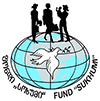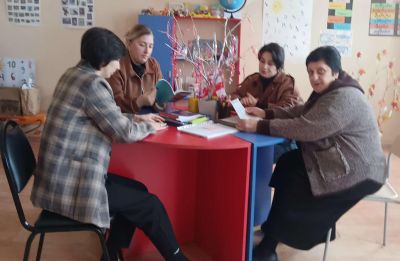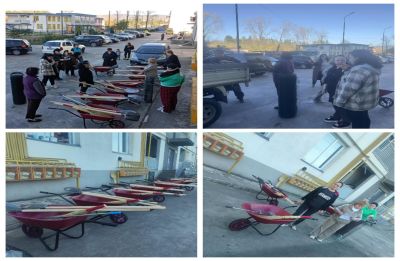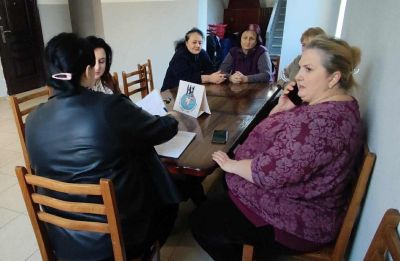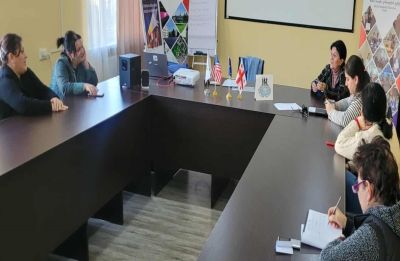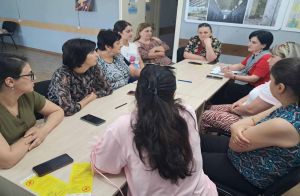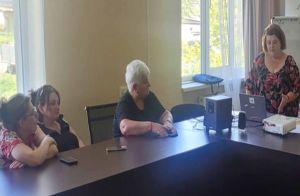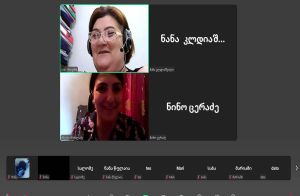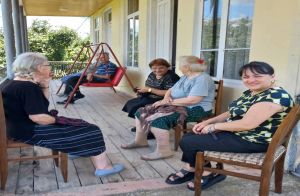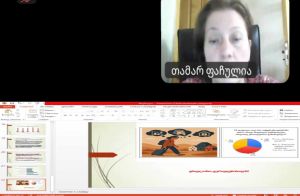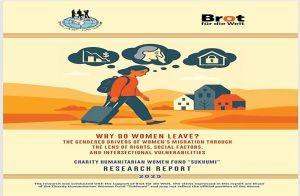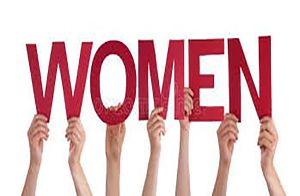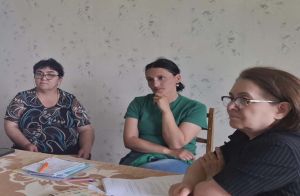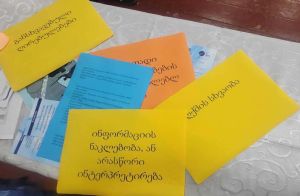The topic of discussion at the mutual assistance group meeting in Senaki was social activity. The participants received information: what social activity is, what needs to be done, who are the main actors, why social activity is important for the community and what benefits it brings.
The participants' awareness of social activity issues was determined by filling out pre- and post-tests.
The group participants signed a charter that describes the group's goals, management, and the rights and responsibilities of the participants. They are ready to work in accordance with the charter to solve community problems.
The final part of the meeting was devoted to discussing problems. The mutual assistance group participants noted that based on the information received, social activity will be strengthened, this will help identify community problems and solve them by uniting the resources.
A meeting with members of the mutual assistance group was held on Abkhazeti Street in Khoni, in the IDP settlement.
The group members learned about the essence and goals of social activity, how important it is for people to be active in solving their problems.
At the beginning of the meeting, the participants filled out a preliminary test, and after familiarizing themselves with the information provided, a post-test assessing their knowledge and views on social activity.
At the end, the participants familiarized themselves with and accepted the pre-developed charter of the mutual assistance group: general provisions, goals of the group, rules for electing/selecting participants, rights and responsibilities, management structure, frequency of meetings.
They decided to listen to the opinions of community residents - what worries them and what problems they consider a priority within the framework of civil initiatives.
The topics of conflict management and violence prevention are especially relevant for young people, as these issues are related to their everyday lives. During the meetings, they discuss various forms of violence, ways of peaceful resolution of conflicts, and the need for mutual support.
Participants note that open communication and exchange of experiences in a free space are very important for them. They are more aware of the dangers of violence, discuss protection mechanisms, and are ready to share information with others.
Young people hope that their participation will contribute to further awareness raising among their peers, which will contribute to the creation of a peaceful and safe environment.
The project is implemented with the support of the organization Brot
für die Welt - Evangelischer Entwicklungsdienst (Germany)
Trainings with young people on conflict management and violence prevention are actively conducted. The goal of the trainings is to develop critical thinking, empathy and peaceful communication skills among the young people.
During the trainings, participants actively participate in discussions, role-playing games and group exercises which help them better understand the essence of the conflict and find non-violent solutions to everyday situations.
After the trainings, young people strive to create a safe and favorable environment, based on their own ideas, where different opinions do not lead to confrontation, but become a space for cooperation and development.
Such trainings help strengthen the culture of peace among young people and create a more effective model of coexistence in society in the long term prospect.
The project is implemented with the support of the organization Brot
für die Welt - Evangelischer Entwicklungsdienst (Germany)
How do Women Support Centers evaluate the activities of the Fund “Sukhumi”? What results do they provide and how important are monthly information meetings? What kind of support do women need?
Internal monitoring was conducted to answer these questions.
Meeting participants openly express their mood and share new ideas:
- These meetings are a source of new information for us. Violence against women has not ended, and we must strengthen our positions in the fight against this problem.
- Women rarely have the opportunity to get together and express their thoughts, tired of the daily routine, we find a different mood, and we really need it.
- I am glad that you think about women, about our empowerment. Our self-esteem is growing. New ideas appear. It would be good if we were given the opportunity to implement our ideas.
The meetings were held in the Women Support Centers of Zugdidi/Khurcha, Senaki, Khoni and Khobi.
The project is implemented with the support of the organization Brot
für die Welt - Evangelischer Entwicklungsdienst (Germany)
A civil dialogue with women's groups on the issues of migration was held in Kutaisi. The meeting participants – women representing different social groups – got acquainted with the research of the Women Fund "Sukhumi" "Gender Dimension of the Causes of Women Migration through the Prism of Rights, Social Factors and Intersectional Vulnerability". Then a dialogue regarding the reasons of women migration and its social consequences, measures to prevent migration was held.
The participants gave a number of examples – along with the positive economic effect, the traumatic impact of migration on the women migrants themselves, their family members, especially children. They painfully noted moments of alienation and other psycho-emotional difficulties.
There was a discussion on what efforts, in addition to structural solutions, ordinary members of society can undertake to reduce migration trends and reduce its negative psycho-emotional consequences. Interesting ideas were expressed about community-level activities and the resources needed for them. The next stage is planned to select and implement the most interesting initiatives.
The project is implemented with the support of the organization Brot
für die Welt - Evangelischer Entwicklungsdienst (Germany)
Women Fund “Sukhumi’s” new report “Why Do Women Leave? The Gender Dimension of Women’s Migration Drivers Through the Lens of Rights, Social Factors, and Intersectional Vulnerability” presents the findings of a study conducted in 11 municipalities of Western Georgia, involving 600 women respondents. The report analyses the phenomenon of women’s migration from a gender perspective, viewing migration not merely as an economic process but as one rooted in multifaceted social, rights-related, and structural causes.
The data reveals that for many women migration is not a matter of choice but rather a forced strategy to escape domestic violence, rights-based subordination, and lack of social services. Migration intentions are particularly high among young and economically active women, which has significant implications for the country’s demographic structure and prospects for social development. The report highlights the role of intersectional vulnerability, such as displacement, proximity to conflict-dividing lines, and social insecurity, which further heighten migration risks. The study demonstrates that preventing forced migration requires comprehensive and gender-sensitive policies oriented towards strengthening women’s economic, social, and rights-based empowerment.
The project is implemented with the support of the organization Brot
für die Welt - Evangelischer Entwicklungsdienst (Germany)
The project "Women Act for Peace and Strengthening Local Communities" is implemented by a coalition of NGOs - the Association of IDP Women "Consent", the Women's Information Center and the Charitable Humanitarian Women Fund “Sukhumi”.
The activities are attended by IDPs (living in IDP settlements or collective centers), women and youth living in villages along the dividing line from 15 target municipalities: Kareli, Gori, Kaspi, Khashuri, Tetritskaro, Gardabani, Tskaltubo, Kutaisi, Khoni, Sachkhere, Poti, Zugdidi, Tsalenjikha, Senaki, Mestia.
Our target municipalities are: Kutaisi, Tskaltubo, Khoni, Senaki and Poti.
The project aims to promote public initiatives through the formation and support of mutual assistance groups in order to improve the social and economic situation of communities affected by the conflict. In addition, it is planned to strengthen the organizational structure of the Network of Women and Youth - Peace Ambassadors.
Discussions on the psychosocial, economic, legal, structural aspects of migration and its prevention were held with women groups of Khoni and Khobi municipalities. They were familiarized with the results of the research of the Charitable Humanitarian Women Fund “Sukhumi”, and discussed ways to prevent migration and reduce its negative consequences.
The women had visions based on their life experience about how important it is and what needs to be done to reduce migration and mitigate its consequences, reintegrate women in emigration and improve the psychosocial climate in their families.
They believe that they have the resources to implement small civil initiatives and can initiate meetings on migration risks, for example, with discussions based on real stories. Particular interest was expressed in raising awareness of possible negative changes in the emotional and behavioral state of children, as they see many negative examples that worsen the climate of families and, in general, society. Specific ideas will be discussed at future meetings.
The project is implemented with the support of the organization Brot
für die Welt - Evangelischer Entwicklungsdienst (Germany)
Trainings on: "Conflict escalation and examples" and "Tolerance among young people" were held with members of youth groups of 10 municipalities.
8 live and 2 online meetings were held.
Despite the summer holidays, young people attended the trainings with interest, actively participated in the exercises and understood the seriousness of the problems through role playing games.
From the feedback of the participants:
"This is the first time I've heard the term “escalation” and I think I'll remember it."
"With your explanation and posters, we easily saw the stages of the conflict and how it escalates."
"The role playing was very interesting. We stopped at the stages of escalation before the problem escalated."
"Georgia is a tolerant country. We must respect all people, regardless of their culture, faith or views."
The project is implemented with the support of the organization Brot
für die Welt - Evangelischer Entwicklungsdienst (Germany)
